David Game College: Reflective Professional Practice Report Analysis
VerifiedAdded on 2022/12/27
|10
|2810
|55
Report
AI Summary
This report, prepared for a Higher National Diploma (HND) in Public Service at David Game College, examines reflective professional practice within the context of a youth offending module. The introduction establishes the significance of reflective practice for continuous learning and its application in practice-based professional settings. Task 1 defines reflective practice, its meaning, and its practical application, using seminar activities to illustrate concepts like the need for a separate youth justice system and the impact of criminal responsibility. Task 2 identifies and differentiates between the types of reflective practice: reflection-in-action and reflection-on-action, providing examples from the student's experience. Furthermore, it evaluates various reflective practice models, including Kolb's experiential learning model and Schon's model of reflection in and on action. Task 3 outlines a plan for carrying out reflective practice, detailing skills to be improved, such as communication and analysis, within a specified timeframe. The report concludes in Task 4 by interpreting the use of reflective practice for future development, emphasizing its role in informed decision-making and action planning, and providing a plan for the future.
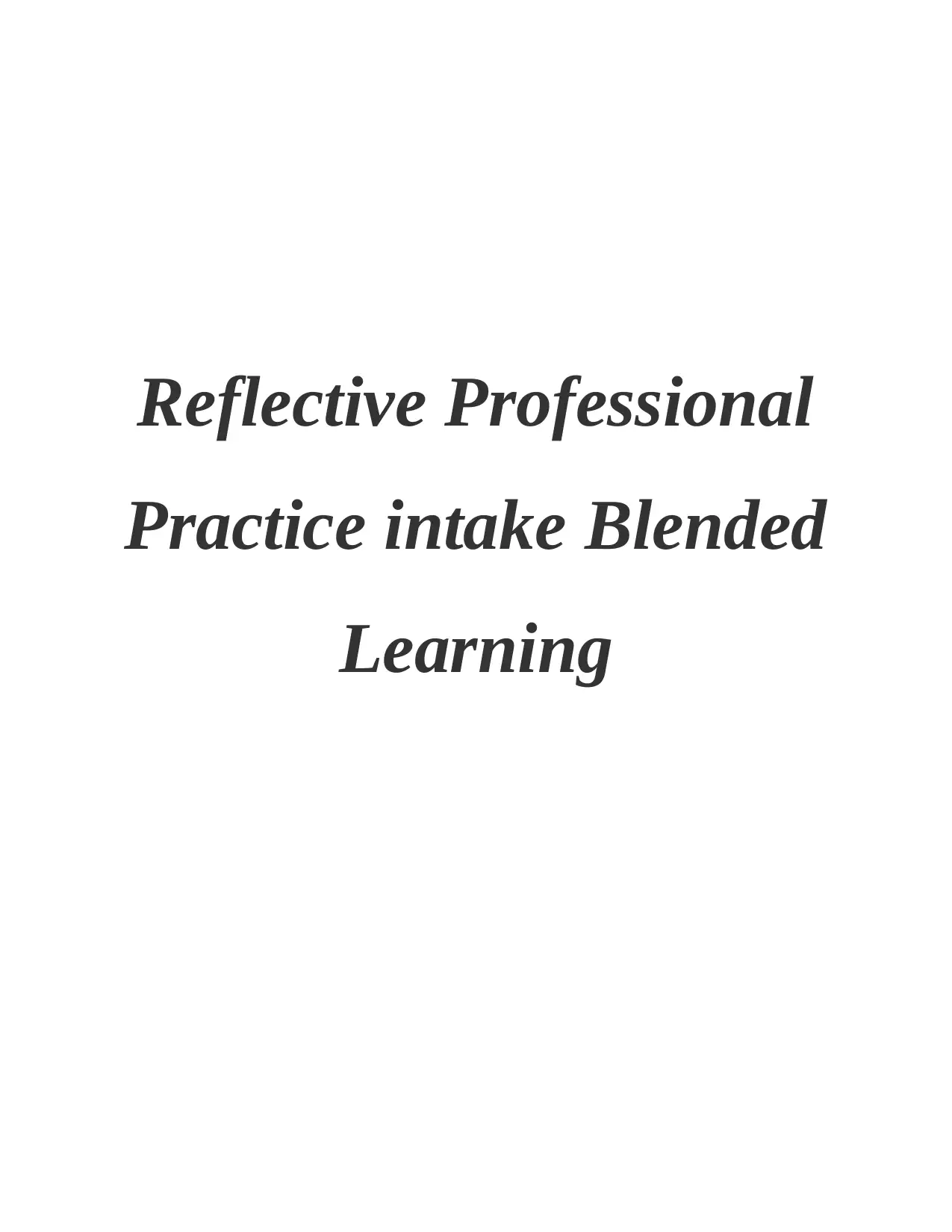
Reflective Professional
Practice intake Blended
Learning
Practice intake Blended
Learning
Paraphrase This Document
Need a fresh take? Get an instant paraphrase of this document with our AI Paraphraser
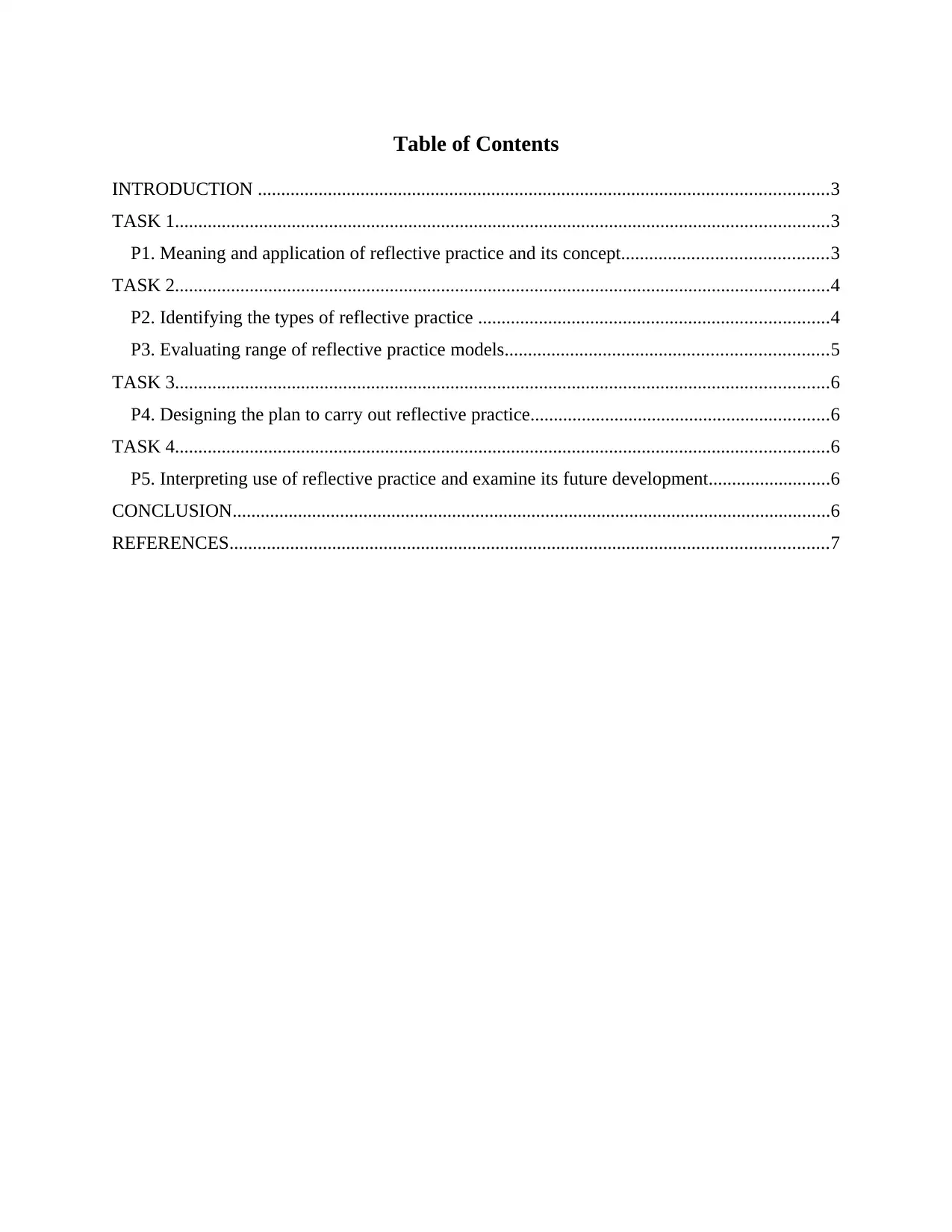
Table of Contents
INTRODUCTION ..........................................................................................................................3
TASK 1............................................................................................................................................3
P1. Meaning and application of reflective practice and its concept............................................3
TASK 2............................................................................................................................................4
P2. Identifying the types of reflective practice ...........................................................................4
P3. Evaluating range of reflective practice models.....................................................................5
TASK 3............................................................................................................................................6
P4. Designing the plan to carry out reflective practice................................................................6
TASK 4............................................................................................................................................6
P5. Interpreting use of reflective practice and examine its future development..........................6
CONCLUSION................................................................................................................................6
REFERENCES................................................................................................................................7
INTRODUCTION ..........................................................................................................................3
TASK 1............................................................................................................................................3
P1. Meaning and application of reflective practice and its concept............................................3
TASK 2............................................................................................................................................4
P2. Identifying the types of reflective practice ...........................................................................4
P3. Evaluating range of reflective practice models.....................................................................5
TASK 3............................................................................................................................................6
P4. Designing the plan to carry out reflective practice................................................................6
TASK 4............................................................................................................................................6
P5. Interpreting use of reflective practice and examine its future development..........................6
CONCLUSION................................................................................................................................6
REFERENCES................................................................................................................................7
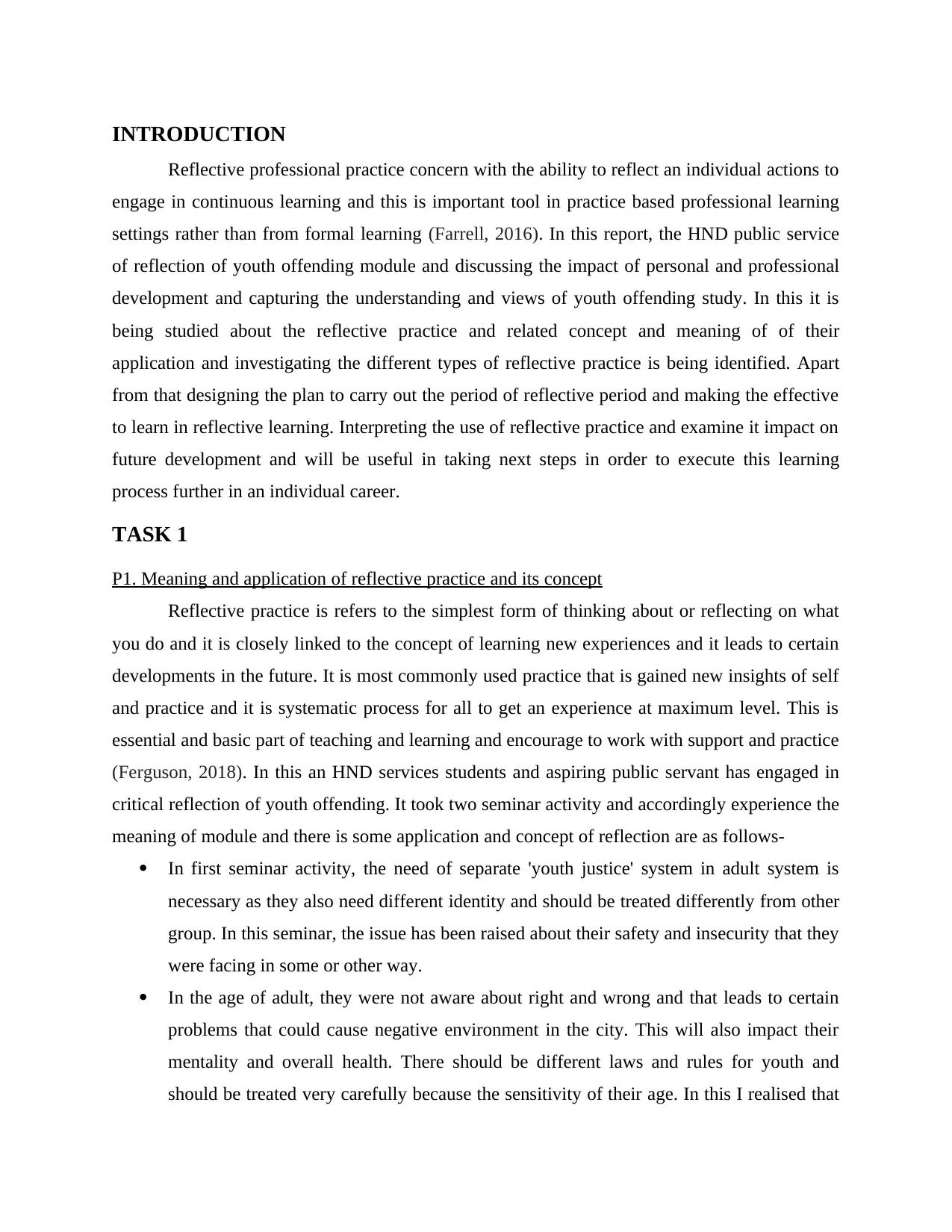
INTRODUCTION
Reflective professional practice concern with the ability to reflect an individual actions to
engage in continuous learning and this is important tool in practice based professional learning
settings rather than from formal learning (Farrell, 2016). In this report, the HND public service
of reflection of youth offending module and discussing the impact of personal and professional
development and capturing the understanding and views of youth offending study. In this it is
being studied about the reflective practice and related concept and meaning of of their
application and investigating the different types of reflective practice is being identified. Apart
from that designing the plan to carry out the period of reflective period and making the effective
to learn in reflective learning. Interpreting the use of reflective practice and examine it impact on
future development and will be useful in taking next steps in order to execute this learning
process further in an individual career.
TASK 1
P1. Meaning and application of reflective practice and its concept
Reflective practice is refers to the simplest form of thinking about or reflecting on what
you do and it is closely linked to the concept of learning new experiences and it leads to certain
developments in the future. It is most commonly used practice that is gained new insights of self
and practice and it is systematic process for all to get an experience at maximum level. This is
essential and basic part of teaching and learning and encourage to work with support and practice
(Ferguson, 2018). In this an HND services students and aspiring public servant has engaged in
critical reflection of youth offending. It took two seminar activity and accordingly experience the
meaning of module and there is some application and concept of reflection are as follows-
In first seminar activity, the need of separate 'youth justice' system in adult system is
necessary as they also need different identity and should be treated differently from other
group. In this seminar, the issue has been raised about their safety and insecurity that they
were facing in some or other way.
In the age of adult, they were not aware about right and wrong and that leads to certain
problems that could cause negative environment in the city. This will also impact their
mentality and overall health. There should be different laws and rules for youth and
should be treated very carefully because the sensitivity of their age. In this I realised that
Reflective professional practice concern with the ability to reflect an individual actions to
engage in continuous learning and this is important tool in practice based professional learning
settings rather than from formal learning (Farrell, 2016). In this report, the HND public service
of reflection of youth offending module and discussing the impact of personal and professional
development and capturing the understanding and views of youth offending study. In this it is
being studied about the reflective practice and related concept and meaning of of their
application and investigating the different types of reflective practice is being identified. Apart
from that designing the plan to carry out the period of reflective period and making the effective
to learn in reflective learning. Interpreting the use of reflective practice and examine it impact on
future development and will be useful in taking next steps in order to execute this learning
process further in an individual career.
TASK 1
P1. Meaning and application of reflective practice and its concept
Reflective practice is refers to the simplest form of thinking about or reflecting on what
you do and it is closely linked to the concept of learning new experiences and it leads to certain
developments in the future. It is most commonly used practice that is gained new insights of self
and practice and it is systematic process for all to get an experience at maximum level. This is
essential and basic part of teaching and learning and encourage to work with support and practice
(Ferguson, 2018). In this an HND services students and aspiring public servant has engaged in
critical reflection of youth offending. It took two seminar activity and accordingly experience the
meaning of module and there is some application and concept of reflection are as follows-
In first seminar activity, the need of separate 'youth justice' system in adult system is
necessary as they also need different identity and should be treated differently from other
group. In this seminar, the issue has been raised about their safety and insecurity that they
were facing in some or other way.
In the age of adult, they were not aware about right and wrong and that leads to certain
problems that could cause negative environment in the city. This will also impact their
mentality and overall health. There should be different laws and rules for youth and
should be treated very carefully because the sensitivity of their age. In this I realised that
⊘ This is a preview!⊘
Do you want full access?
Subscribe today to unlock all pages.

Trusted by 1+ million students worldwide
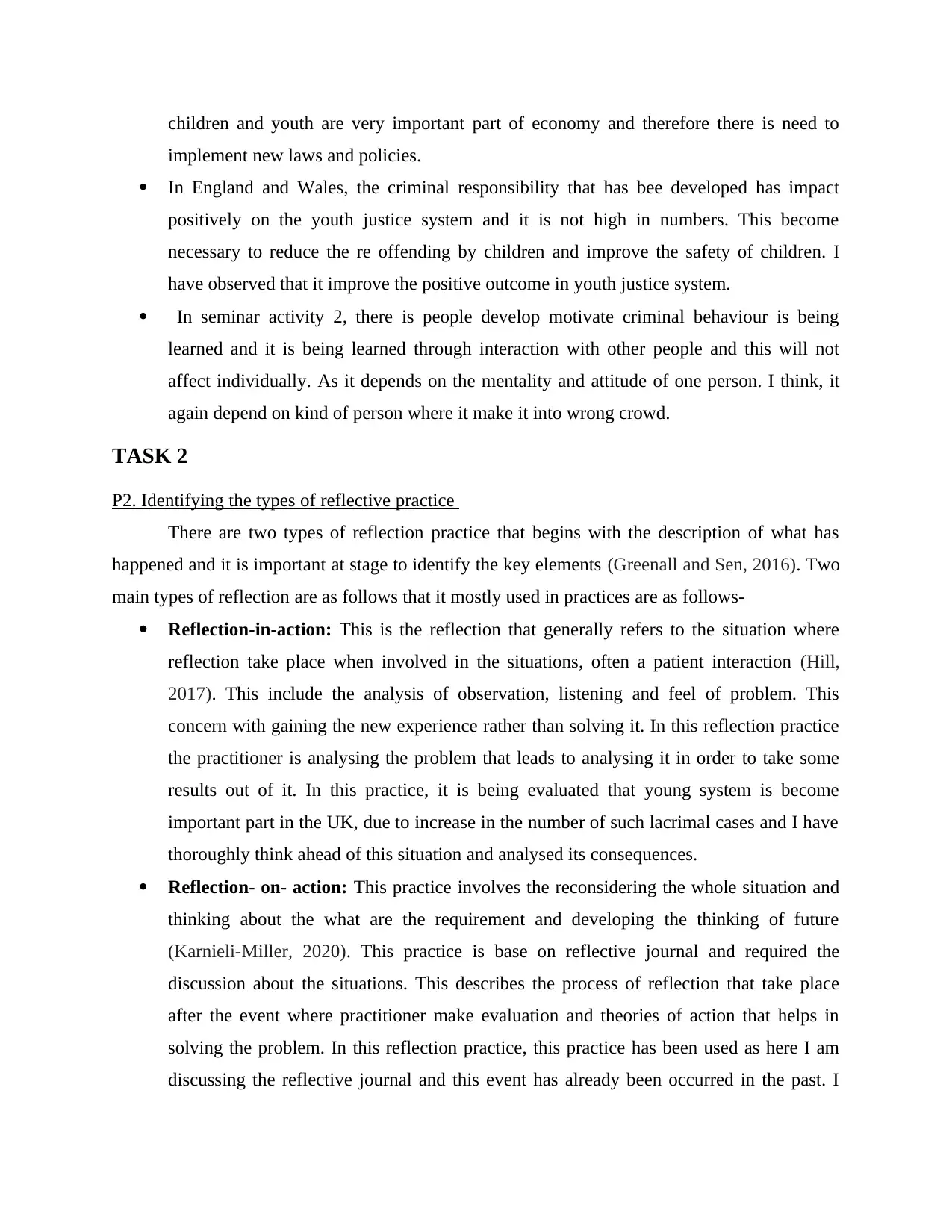
children and youth are very important part of economy and therefore there is need to
implement new laws and policies.
In England and Wales, the criminal responsibility that has bee developed has impact
positively on the youth justice system and it is not high in numbers. This become
necessary to reduce the re offending by children and improve the safety of children. I
have observed that it improve the positive outcome in youth justice system.
In seminar activity 2, there is people develop motivate criminal behaviour is being
learned and it is being learned through interaction with other people and this will not
affect individually. As it depends on the mentality and attitude of one person. I think, it
again depend on kind of person where it make it into wrong crowd.
TASK 2
P2. Identifying the types of reflective practice
There are two types of reflection practice that begins with the description of what has
happened and it is important at stage to identify the key elements (Greenall and Sen, 2016). Two
main types of reflection are as follows that it mostly used in practices are as follows-
Reflection-in-action: This is the reflection that generally refers to the situation where
reflection take place when involved in the situations, often a patient interaction (Hill,
2017). This include the analysis of observation, listening and feel of problem. This
concern with gaining the new experience rather than solving it. In this reflection practice
the practitioner is analysing the problem that leads to analysing it in order to take some
results out of it. In this practice, it is being evaluated that young system is become
important part in the UK, due to increase in the number of such lacrimal cases and I have
thoroughly think ahead of this situation and analysed its consequences.
Reflection- on- action: This practice involves the reconsidering the whole situation and
thinking about the what are the requirement and developing the thinking of future
(Karnieli-Miller, 2020). This practice is base on reflective journal and required the
discussion about the situations. This describes the process of reflection that take place
after the event where practitioner make evaluation and theories of action that helps in
solving the problem. In this reflection practice, this practice has been used as here I am
discussing the reflective journal and this event has already been occurred in the past. I
implement new laws and policies.
In England and Wales, the criminal responsibility that has bee developed has impact
positively on the youth justice system and it is not high in numbers. This become
necessary to reduce the re offending by children and improve the safety of children. I
have observed that it improve the positive outcome in youth justice system.
In seminar activity 2, there is people develop motivate criminal behaviour is being
learned and it is being learned through interaction with other people and this will not
affect individually. As it depends on the mentality and attitude of one person. I think, it
again depend on kind of person where it make it into wrong crowd.
TASK 2
P2. Identifying the types of reflective practice
There are two types of reflection practice that begins with the description of what has
happened and it is important at stage to identify the key elements (Greenall and Sen, 2016). Two
main types of reflection are as follows that it mostly used in practices are as follows-
Reflection-in-action: This is the reflection that generally refers to the situation where
reflection take place when involved in the situations, often a patient interaction (Hill,
2017). This include the analysis of observation, listening and feel of problem. This
concern with gaining the new experience rather than solving it. In this reflection practice
the practitioner is analysing the problem that leads to analysing it in order to take some
results out of it. In this practice, it is being evaluated that young system is become
important part in the UK, due to increase in the number of such lacrimal cases and I have
thoroughly think ahead of this situation and analysed its consequences.
Reflection- on- action: This practice involves the reconsidering the whole situation and
thinking about the what are the requirement and developing the thinking of future
(Karnieli-Miller, 2020). This practice is base on reflective journal and required the
discussion about the situations. This describes the process of reflection that take place
after the event where practitioner make evaluation and theories of action that helps in
solving the problem. In this reflection practice, this practice has been used as here I am
discussing the reflective journal and this event has already been occurred in the past. I
Paraphrase This Document
Need a fresh take? Get an instant paraphrase of this document with our AI Paraphraser
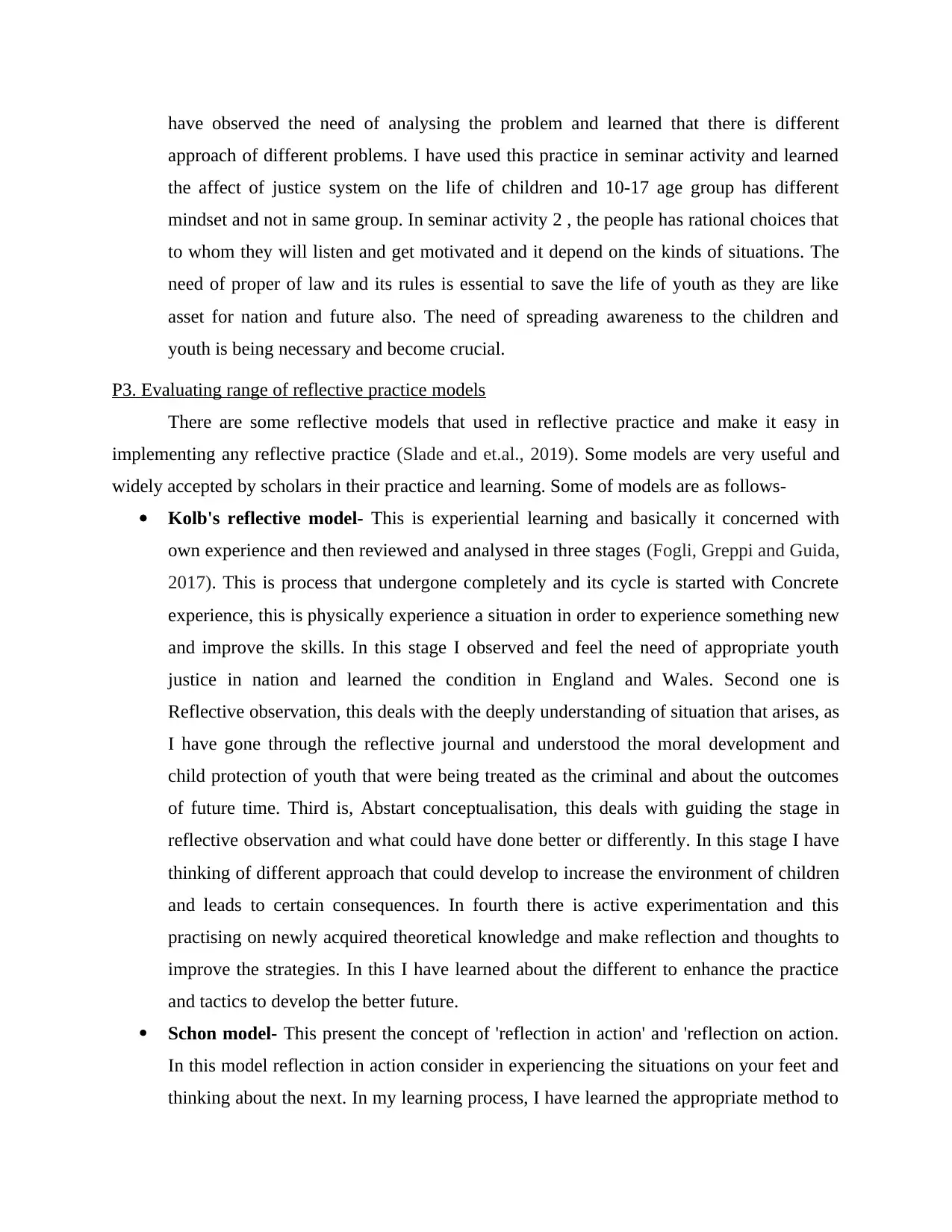
have observed the need of analysing the problem and learned that there is different
approach of different problems. I have used this practice in seminar activity and learned
the affect of justice system on the life of children and 10-17 age group has different
mindset and not in same group. In seminar activity 2 , the people has rational choices that
to whom they will listen and get motivated and it depend on the kinds of situations. The
need of proper of law and its rules is essential to save the life of youth as they are like
asset for nation and future also. The need of spreading awareness to the children and
youth is being necessary and become crucial.
P3. Evaluating range of reflective practice models
There are some reflective models that used in reflective practice and make it easy in
implementing any reflective practice (Slade and et.al., 2019). Some models are very useful and
widely accepted by scholars in their practice and learning. Some of models are as follows-
Kolb's reflective model- This is experiential learning and basically it concerned with
own experience and then reviewed and analysed in three stages (Fogli, Greppi and Guida,
2017). This is process that undergone completely and its cycle is started with Concrete
experience, this is physically experience a situation in order to experience something new
and improve the skills. In this stage I observed and feel the need of appropriate youth
justice in nation and learned the condition in England and Wales. Second one is
Reflective observation, this deals with the deeply understanding of situation that arises, as
I have gone through the reflective journal and understood the moral development and
child protection of youth that were being treated as the criminal and about the outcomes
of future time. Third is, Abstart conceptualisation, this deals with guiding the stage in
reflective observation and what could have done better or differently. In this stage I have
thinking of different approach that could develop to increase the environment of children
and leads to certain consequences. In fourth there is active experimentation and this
practising on newly acquired theoretical knowledge and make reflection and thoughts to
improve the strategies. In this I have learned about the different to enhance the practice
and tactics to develop the better future.
Schon model- This present the concept of 'reflection in action' and 'reflection on action.
In this model reflection in action consider in experiencing the situations on your feet and
thinking about the next. In my learning process, I have learned the appropriate method to
approach of different problems. I have used this practice in seminar activity and learned
the affect of justice system on the life of children and 10-17 age group has different
mindset and not in same group. In seminar activity 2 , the people has rational choices that
to whom they will listen and get motivated and it depend on the kinds of situations. The
need of proper of law and its rules is essential to save the life of youth as they are like
asset for nation and future also. The need of spreading awareness to the children and
youth is being necessary and become crucial.
P3. Evaluating range of reflective practice models
There are some reflective models that used in reflective practice and make it easy in
implementing any reflective practice (Slade and et.al., 2019). Some models are very useful and
widely accepted by scholars in their practice and learning. Some of models are as follows-
Kolb's reflective model- This is experiential learning and basically it concerned with
own experience and then reviewed and analysed in three stages (Fogli, Greppi and Guida,
2017). This is process that undergone completely and its cycle is started with Concrete
experience, this is physically experience a situation in order to experience something new
and improve the skills. In this stage I observed and feel the need of appropriate youth
justice in nation and learned the condition in England and Wales. Second one is
Reflective observation, this deals with the deeply understanding of situation that arises, as
I have gone through the reflective journal and understood the moral development and
child protection of youth that were being treated as the criminal and about the outcomes
of future time. Third is, Abstart conceptualisation, this deals with guiding the stage in
reflective observation and what could have done better or differently. In this stage I have
thinking of different approach that could develop to increase the environment of children
and leads to certain consequences. In fourth there is active experimentation and this
practising on newly acquired theoretical knowledge and make reflection and thoughts to
improve the strategies. In this I have learned about the different to enhance the practice
and tactics to develop the better future.
Schon model- This present the concept of 'reflection in action' and 'reflection on action.
In this model reflection in action consider in experiencing the situations on your feet and
thinking about the next. In my learning process, I have learned the appropriate method to
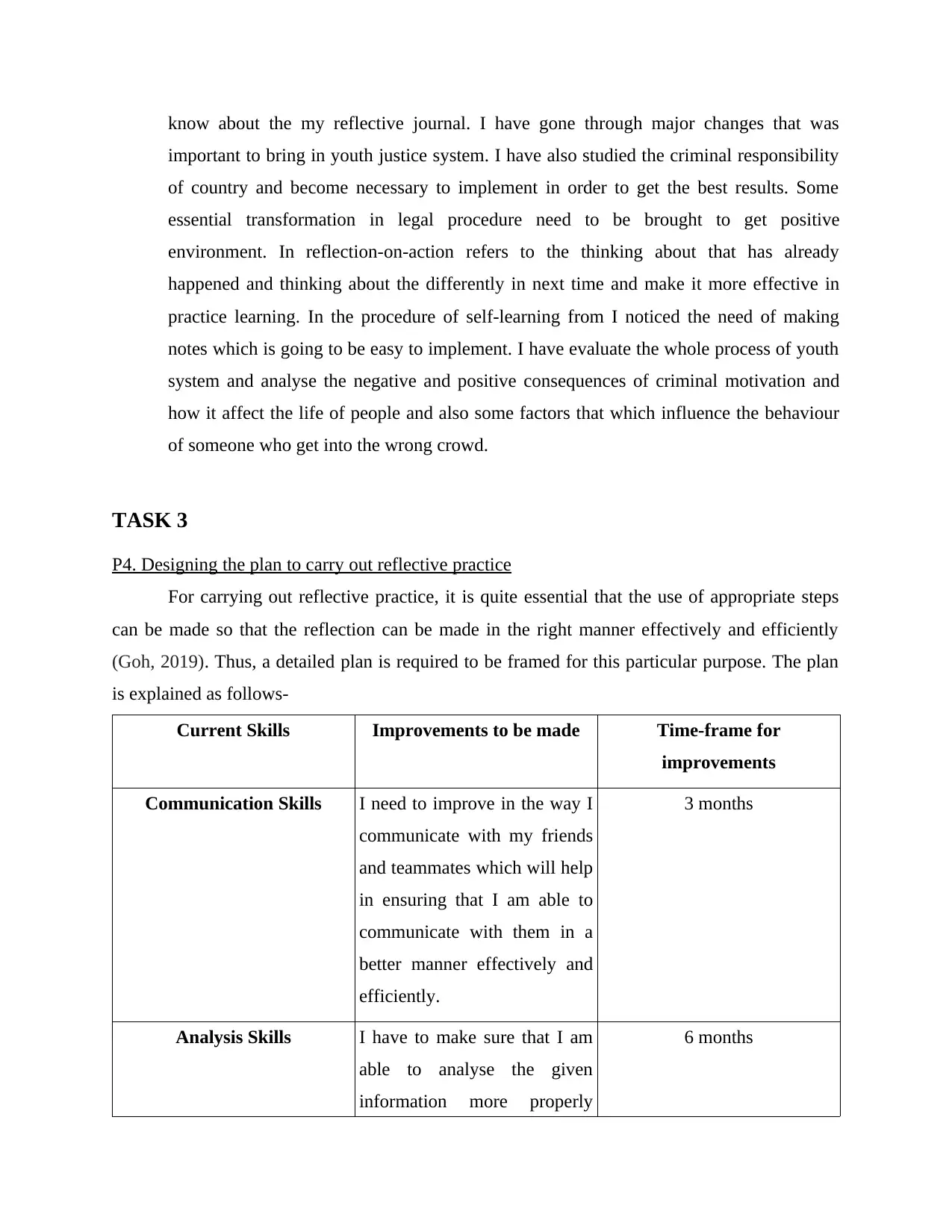
know about the my reflective journal. I have gone through major changes that was
important to bring in youth justice system. I have also studied the criminal responsibility
of country and become necessary to implement in order to get the best results. Some
essential transformation in legal procedure need to be brought to get positive
environment. In reflection-on-action refers to the thinking about that has already
happened and thinking about the differently in next time and make it more effective in
practice learning. In the procedure of self-learning from I noticed the need of making
notes which is going to be easy to implement. I have evaluate the whole process of youth
system and analyse the negative and positive consequences of criminal motivation and
how it affect the life of people and also some factors that which influence the behaviour
of someone who get into the wrong crowd.
TASK 3
P4. Designing the plan to carry out reflective practice
For carrying out reflective practice, it is quite essential that the use of appropriate steps
can be made so that the reflection can be made in the right manner effectively and efficiently
(Goh, 2019). Thus, a detailed plan is required to be framed for this particular purpose. The plan
is explained as follows-
Current Skills Improvements to be made Time-frame for
improvements
Communication Skills I need to improve in the way I
communicate with my friends
and teammates which will help
in ensuring that I am able to
communicate with them in a
better manner effectively and
efficiently.
3 months
Analysis Skills I have to make sure that I am
able to analyse the given
information more properly
6 months
important to bring in youth justice system. I have also studied the criminal responsibility
of country and become necessary to implement in order to get the best results. Some
essential transformation in legal procedure need to be brought to get positive
environment. In reflection-on-action refers to the thinking about that has already
happened and thinking about the differently in next time and make it more effective in
practice learning. In the procedure of self-learning from I noticed the need of making
notes which is going to be easy to implement. I have evaluate the whole process of youth
system and analyse the negative and positive consequences of criminal motivation and
how it affect the life of people and also some factors that which influence the behaviour
of someone who get into the wrong crowd.
TASK 3
P4. Designing the plan to carry out reflective practice
For carrying out reflective practice, it is quite essential that the use of appropriate steps
can be made so that the reflection can be made in the right manner effectively and efficiently
(Goh, 2019). Thus, a detailed plan is required to be framed for this particular purpose. The plan
is explained as follows-
Current Skills Improvements to be made Time-frame for
improvements
Communication Skills I need to improve in the way I
communicate with my friends
and teammates which will help
in ensuring that I am able to
communicate with them in a
better manner effectively and
efficiently.
3 months
Analysis Skills I have to make sure that I am
able to analyse the given
information more properly
6 months
⊘ This is a preview!⊘
Do you want full access?
Subscribe today to unlock all pages.

Trusted by 1+ million students worldwide
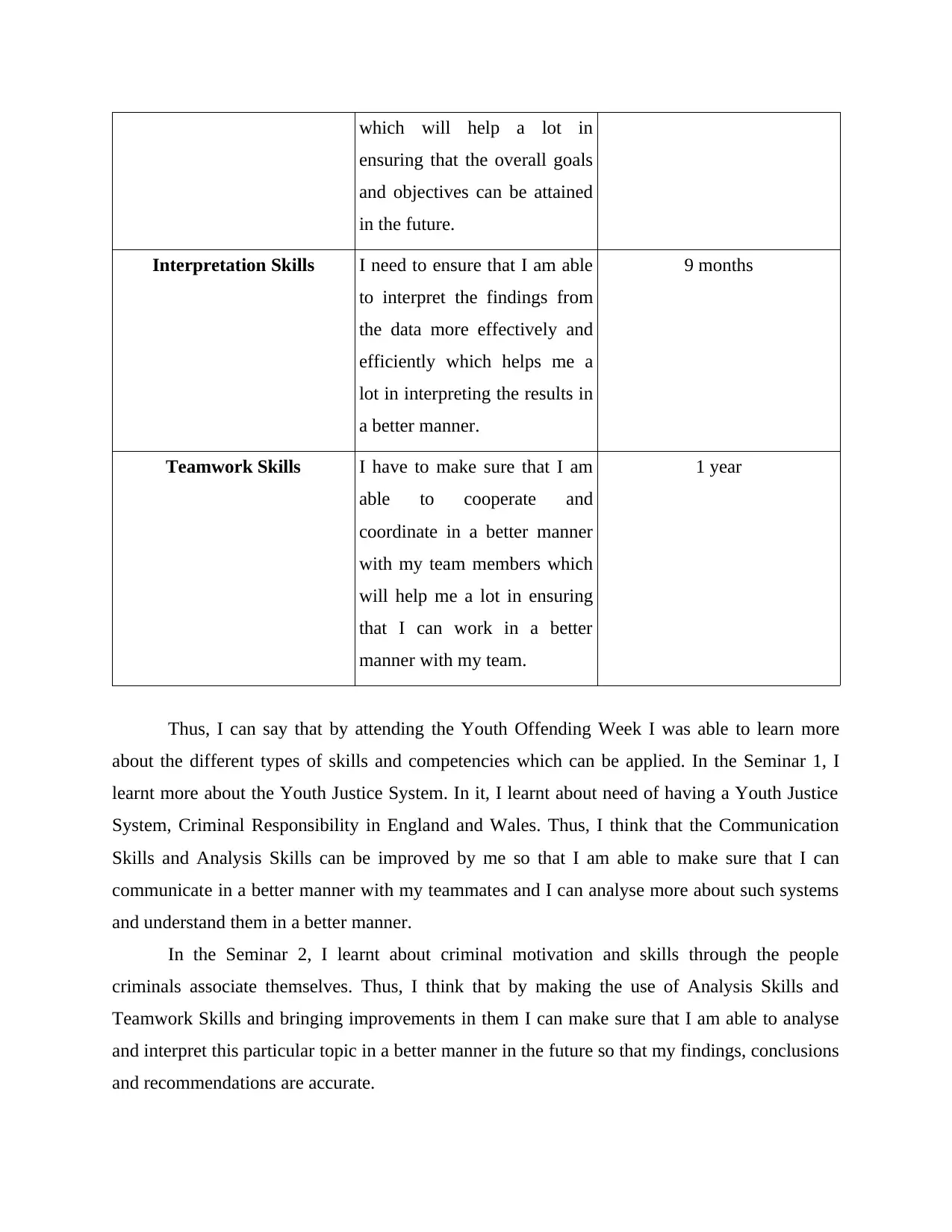
which will help a lot in
ensuring that the overall goals
and objectives can be attained
in the future.
Interpretation Skills I need to ensure that I am able
to interpret the findings from
the data more effectively and
efficiently which helps me a
lot in interpreting the results in
a better manner.
9 months
Teamwork Skills I have to make sure that I am
able to cooperate and
coordinate in a better manner
with my team members which
will help me a lot in ensuring
that I can work in a better
manner with my team.
1 year
Thus, I can say that by attending the Youth Offending Week I was able to learn more
about the different types of skills and competencies which can be applied. In the Seminar 1, I
learnt more about the Youth Justice System. In it, I learnt about need of having a Youth Justice
System, Criminal Responsibility in England and Wales. Thus, I think that the Communication
Skills and Analysis Skills can be improved by me so that I am able to make sure that I can
communicate in a better manner with my teammates and I can analyse more about such systems
and understand them in a better manner.
In the Seminar 2, I learnt about criminal motivation and skills through the people
criminals associate themselves. Thus, I think that by making the use of Analysis Skills and
Teamwork Skills and bringing improvements in them I can make sure that I am able to analyse
and interpret this particular topic in a better manner in the future so that my findings, conclusions
and recommendations are accurate.
ensuring that the overall goals
and objectives can be attained
in the future.
Interpretation Skills I need to ensure that I am able
to interpret the findings from
the data more effectively and
efficiently which helps me a
lot in interpreting the results in
a better manner.
9 months
Teamwork Skills I have to make sure that I am
able to cooperate and
coordinate in a better manner
with my team members which
will help me a lot in ensuring
that I can work in a better
manner with my team.
1 year
Thus, I can say that by attending the Youth Offending Week I was able to learn more
about the different types of skills and competencies which can be applied. In the Seminar 1, I
learnt more about the Youth Justice System. In it, I learnt about need of having a Youth Justice
System, Criminal Responsibility in England and Wales. Thus, I think that the Communication
Skills and Analysis Skills can be improved by me so that I am able to make sure that I can
communicate in a better manner with my teammates and I can analyse more about such systems
and understand them in a better manner.
In the Seminar 2, I learnt about criminal motivation and skills through the people
criminals associate themselves. Thus, I think that by making the use of Analysis Skills and
Teamwork Skills and bringing improvements in them I can make sure that I am able to analyse
and interpret this particular topic in a better manner in the future so that my findings, conclusions
and recommendations are accurate.
Paraphrase This Document
Need a fresh take? Get an instant paraphrase of this document with our AI Paraphraser
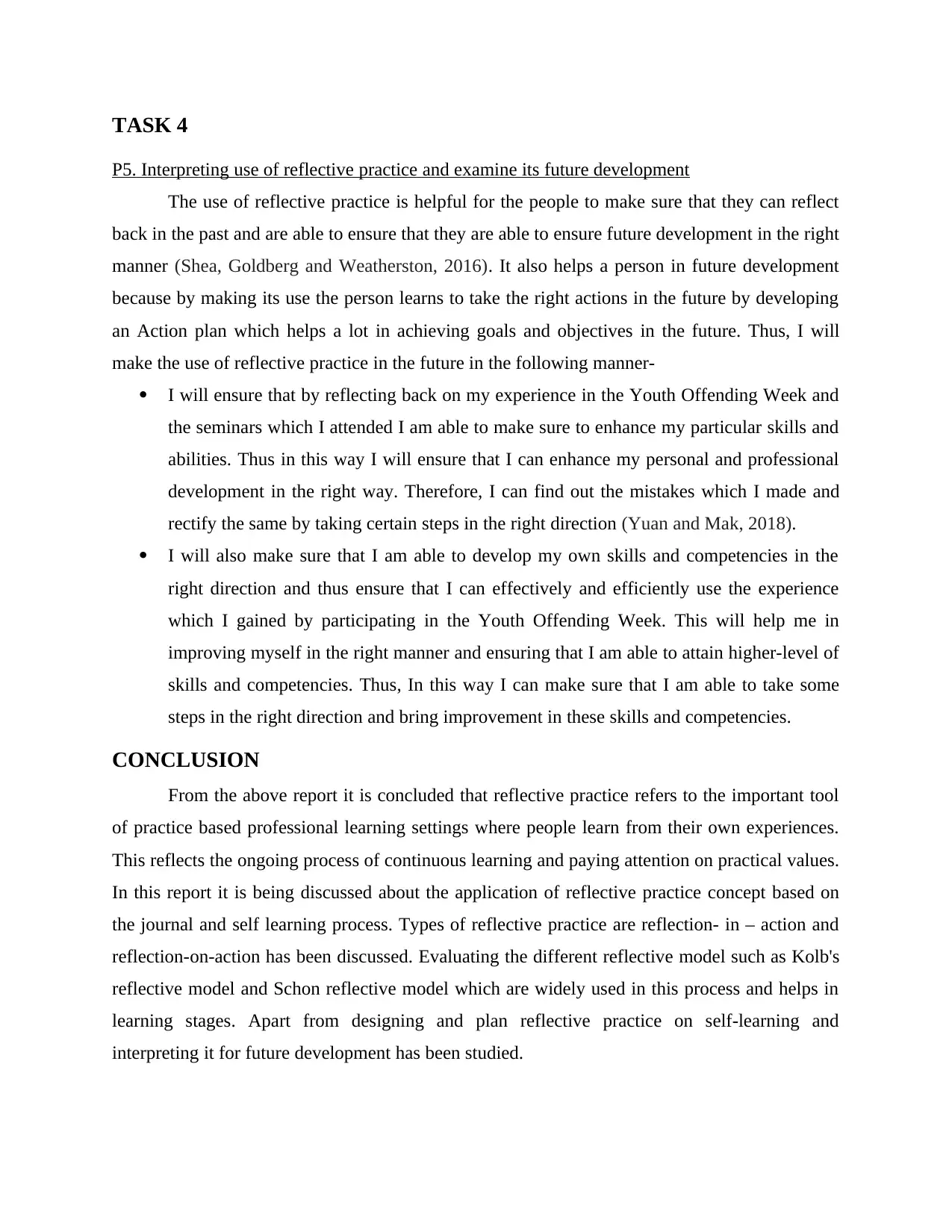
TASK 4
P5. Interpreting use of reflective practice and examine its future development
The use of reflective practice is helpful for the people to make sure that they can reflect
back in the past and are able to ensure that they are able to ensure future development in the right
manner (Shea, Goldberg and Weatherston, 2016). It also helps a person in future development
because by making its use the person learns to take the right actions in the future by developing
an Action plan which helps a lot in achieving goals and objectives in the future. Thus, I will
make the use of reflective practice in the future in the following manner-
I will ensure that by reflecting back on my experience in the Youth Offending Week and
the seminars which I attended I am able to make sure to enhance my particular skills and
abilities. Thus in this way I will ensure that I can enhance my personal and professional
development in the right way. Therefore, I can find out the mistakes which I made and
rectify the same by taking certain steps in the right direction (Yuan and Mak, 2018).
I will also make sure that I am able to develop my own skills and competencies in the
right direction and thus ensure that I can effectively and efficiently use the experience
which I gained by participating in the Youth Offending Week. This will help me in
improving myself in the right manner and ensuring that I am able to attain higher-level of
skills and competencies. Thus, In this way I can make sure that I am able to take some
steps in the right direction and bring improvement in these skills and competencies.
CONCLUSION
From the above report it is concluded that reflective practice refers to the important tool
of practice based professional learning settings where people learn from their own experiences.
This reflects the ongoing process of continuous learning and paying attention on practical values.
In this report it is being discussed about the application of reflective practice concept based on
the journal and self learning process. Types of reflective practice are reflection- in – action and
reflection-on-action has been discussed. Evaluating the different reflective model such as Kolb's
reflective model and Schon reflective model which are widely used in this process and helps in
learning stages. Apart from designing and plan reflective practice on self-learning and
interpreting it for future development has been studied.
P5. Interpreting use of reflective practice and examine its future development
The use of reflective practice is helpful for the people to make sure that they can reflect
back in the past and are able to ensure that they are able to ensure future development in the right
manner (Shea, Goldberg and Weatherston, 2016). It also helps a person in future development
because by making its use the person learns to take the right actions in the future by developing
an Action plan which helps a lot in achieving goals and objectives in the future. Thus, I will
make the use of reflective practice in the future in the following manner-
I will ensure that by reflecting back on my experience in the Youth Offending Week and
the seminars which I attended I am able to make sure to enhance my particular skills and
abilities. Thus in this way I will ensure that I can enhance my personal and professional
development in the right way. Therefore, I can find out the mistakes which I made and
rectify the same by taking certain steps in the right direction (Yuan and Mak, 2018).
I will also make sure that I am able to develop my own skills and competencies in the
right direction and thus ensure that I can effectively and efficiently use the experience
which I gained by participating in the Youth Offending Week. This will help me in
improving myself in the right manner and ensuring that I am able to attain higher-level of
skills and competencies. Thus, In this way I can make sure that I am able to take some
steps in the right direction and bring improvement in these skills and competencies.
CONCLUSION
From the above report it is concluded that reflective practice refers to the important tool
of practice based professional learning settings where people learn from their own experiences.
This reflects the ongoing process of continuous learning and paying attention on practical values.
In this report it is being discussed about the application of reflective practice concept based on
the journal and self learning process. Types of reflective practice are reflection- in – action and
reflection-on-action has been discussed. Evaluating the different reflective model such as Kolb's
reflective model and Schon reflective model which are widely used in this process and helps in
learning stages. Apart from designing and plan reflective practice on self-learning and
interpreting it for future development has been studied.
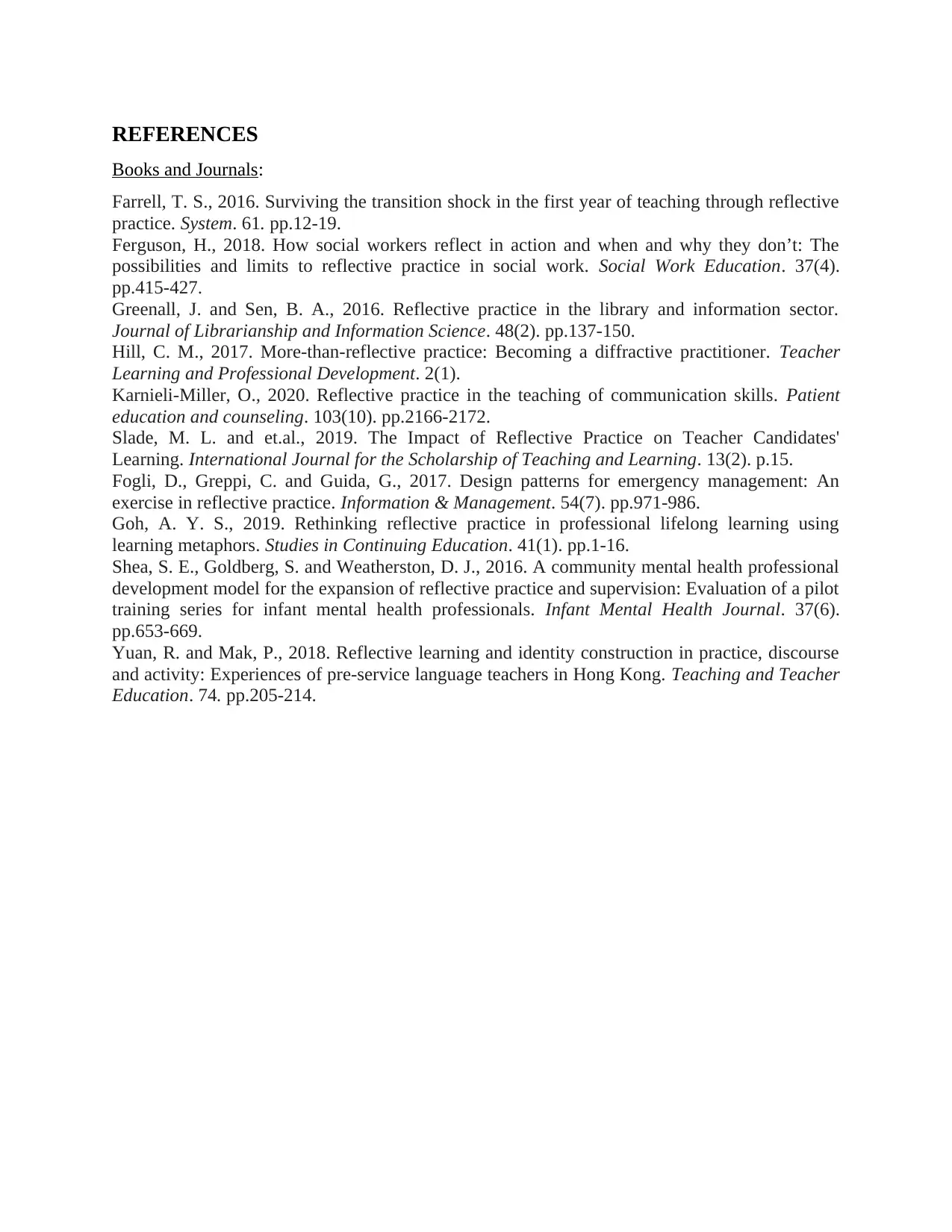
REFERENCES
Books and Journals:
Farrell, T. S., 2016. Surviving the transition shock in the first year of teaching through reflective
practice. System. 61. pp.12-19.
Ferguson, H., 2018. How social workers reflect in action and when and why they don’t: The
possibilities and limits to reflective practice in social work. Social Work Education. 37(4).
pp.415-427.
Greenall, J. and Sen, B. A., 2016. Reflective practice in the library and information sector.
Journal of Librarianship and Information Science. 48(2). pp.137-150.
Hill, C. M., 2017. More-than-reflective practice: Becoming a diffractive practitioner. Teacher
Learning and Professional Development. 2(1).
Karnieli-Miller, O., 2020. Reflective practice in the teaching of communication skills. Patient
education and counseling. 103(10). pp.2166-2172.
Slade, M. L. and et.al., 2019. The Impact of Reflective Practice on Teacher Candidates'
Learning. International Journal for the Scholarship of Teaching and Learning. 13(2). p.15.
Fogli, D., Greppi, C. and Guida, G., 2017. Design patterns for emergency management: An
exercise in reflective practice. Information & Management. 54(7). pp.971-986.
Goh, A. Y. S., 2019. Rethinking reflective practice in professional lifelong learning using
learning metaphors. Studies in Continuing Education. 41(1). pp.1-16.
Shea, S. E., Goldberg, S. and Weatherston, D. J., 2016. A community mental health professional
development model for the expansion of reflective practice and supervision: Evaluation of a pilot
training series for infant mental health professionals. Infant Mental Health Journal. 37(6).
pp.653-669.
Yuan, R. and Mak, P., 2018. Reflective learning and identity construction in practice, discourse
and activity: Experiences of pre-service language teachers in Hong Kong. Teaching and Teacher
Education. 74. pp.205-214.
Books and Journals:
Farrell, T. S., 2016. Surviving the transition shock in the first year of teaching through reflective
practice. System. 61. pp.12-19.
Ferguson, H., 2018. How social workers reflect in action and when and why they don’t: The
possibilities and limits to reflective practice in social work. Social Work Education. 37(4).
pp.415-427.
Greenall, J. and Sen, B. A., 2016. Reflective practice in the library and information sector.
Journal of Librarianship and Information Science. 48(2). pp.137-150.
Hill, C. M., 2017. More-than-reflective practice: Becoming a diffractive practitioner. Teacher
Learning and Professional Development. 2(1).
Karnieli-Miller, O., 2020. Reflective practice in the teaching of communication skills. Patient
education and counseling. 103(10). pp.2166-2172.
Slade, M. L. and et.al., 2019. The Impact of Reflective Practice on Teacher Candidates'
Learning. International Journal for the Scholarship of Teaching and Learning. 13(2). p.15.
Fogli, D., Greppi, C. and Guida, G., 2017. Design patterns for emergency management: An
exercise in reflective practice. Information & Management. 54(7). pp.971-986.
Goh, A. Y. S., 2019. Rethinking reflective practice in professional lifelong learning using
learning metaphors. Studies in Continuing Education. 41(1). pp.1-16.
Shea, S. E., Goldberg, S. and Weatherston, D. J., 2016. A community mental health professional
development model for the expansion of reflective practice and supervision: Evaluation of a pilot
training series for infant mental health professionals. Infant Mental Health Journal. 37(6).
pp.653-669.
Yuan, R. and Mak, P., 2018. Reflective learning and identity construction in practice, discourse
and activity: Experiences of pre-service language teachers in Hong Kong. Teaching and Teacher
Education. 74. pp.205-214.
⊘ This is a preview!⊘
Do you want full access?
Subscribe today to unlock all pages.

Trusted by 1+ million students worldwide

1
1 out of 10
Related Documents
Your All-in-One AI-Powered Toolkit for Academic Success.
+13062052269
info@desklib.com
Available 24*7 on WhatsApp / Email
![[object Object]](/_next/static/media/star-bottom.7253800d.svg)
Unlock your academic potential
Copyright © 2020–2026 A2Z Services. All Rights Reserved. Developed and managed by ZUCOL.





